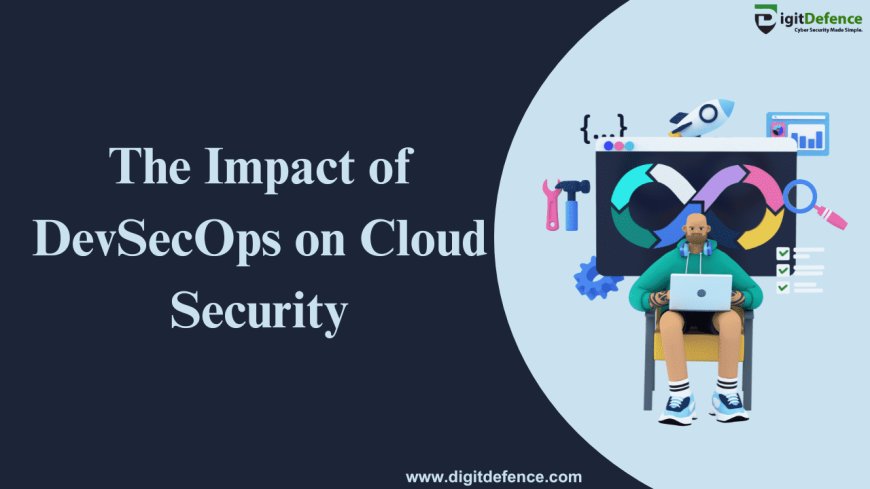The Impact of DevSecOps on Cloud Security
Learn how DevSecOps boosts cloud security by embedding security in every DevOps stage, with continuous integration, automated testing, and better teamwork.

you know how sometimes you need a place to store a lot of stuff, but you don’t want to deal with buying and maintaining a big storage unit? Instead, you just rent space when you need it. That’s kind of what cloud computing is like. Instead of buying and maintaining your own physical servers or data centers, you rent space and services on the internet. Big companies like Amazon Web Services (AWS), Microsoft Azure, and Google Cloud Platform (GCP) provide these services. They allow companies to use their resources as needed, so you don't have to worry about maintenance and simply pay for what you use.
Key Cloud Computing Features:
-
On-Demand use: You don't have to wait for someone to set up the computer resources you require; you can use them whenever you need them.
-
Broad Accessibility: A variety of devices, including laptops, tablets, and phones, can be used to access services from any location.
-
Shared Resources: By allowing several users to use the same resources, expenses are reduced.
-
Flexibility: Depending on your present demands, you can easily add or withdraw resources.
-
Pay for What You use: Just as with a utility bill, you only pay for the resources that you really utilize.
Importance of Cloud Security in Protecting Data
For various reasons, including data protection and business continuity, cloud security is important.
-
Preventing Data Breach: Safeguarding Information By preventing unwanted access to private data, cloud security solutions lower the possibility of data breaches.
-
Encryption of Data:Data that is encrypted is safe and unreadable even in the event that it is intercepted or viewed without authorization.
-
Access Control:By limiting access to specific data and systems to authorized individuals, robust access controls can guard against both internal and external threats.
-
Frequent Security Updates:In order to protect data from the most recent cyberattacks, cloud providers frequently update their security protocols.
Challenges in Traditional Cloud Security Approaches
Many problems with traditional cloud security techniques might expose systems to risk. Response times to threats are impacted by the fact that security measures are sometimes isolated and do not function seamlessly together. Common risks that organizations face include data breaches and incorrectly configured settings, which are difficult for traditional approaches to handle. In addition, security gaps are caused by a lack of integration between the development, security, and operations teams. This is because these teams may not work closely together, which can result in vulnerabilities being missed and remediation taking longer. These problems highlight the need for a more unified and flexible security strategy that fills in these gaps and adapts to changing threats.
What is DevSecOps and How Does It Integrate Security into the DevOps Lifecycle?
The short form for Development, Security, and Operations is DevSecOps. This method incorporates security procedures straight into the development, deployment, and operations stages of the DevOps lifecycle. Security was traditionally managed as a separate process, frequently following development and deployment. This is modified by DevSecOps, which integrates security into every step of the procedure.
This is how it operates:
-
Security as Code: Rather than being added on later, security measures are integrated into the development and code processes from the beginning. This means operations and development teams incorporate security into their regular processes.
-
Automated Security Testing: To find vulnerabilities early in the development process, automated security testing is a part of continuous integration and continuous deployment (CI/CD) pipelines.
-
Collaboration: Development, security, and operations teams work together more closely when using DevSecOps, which makes sure that security issues are resolved quickly and that security guidelines are followed consistently at every level.
The Impact of DevSecOps on Cloud Security
-
Continuous Development of Security:
Seamless Security Practices: DevSecOps incorporates security controls at every development stage, guaranteeing that vulnerabilities are found and fixed quickly. This lowers the possibility that security flaws will go unnoticed.
-
Better Collaboration:
Dismantling Silos: Promotes improved collaboration between the operations, security, and development teams. By working together, we can make sure that security is everyone's responsibility and that security policies and procedures are followed throughout the company.
-
Automated Security Testing:
Early Detection and Remediation: Automated security testing tools are part of CI/CD pipelines, which are designed to continuously check for vulnerabilities. By accelerating detection and remediation, this automation lessens the impact of security flaws.
-
Faster Incident Response:
Proactive Monitoring: Automated warnings and continuous monitoring allow for quick identification and handling of security events. This proactive strategy helps in minimizing possible harm and promptly addressing threats.
-
Uniform Security Procedures:
Uniform Implementation: Ensuring that security policies and controls are applied equally throughout their lifecycle is known as uniform implementation. This reduces the possibility of security breaches and helps in maintaining compliance with industry requirements.
-
Flexibility and Scalability:
Adaptable Security Measures: Flexible and scalable security measures that can expand with the company are supported by adaptable security measures. This flexibility guarantees strong defense against dynamic threats and shifting demands of the company.
Organizations can significantly improve their data protection and business continuity procedures by including DevSecOps into their cloud security procedures. DevSecOps overcomes the disadvantages of traditional security approaches, like isolated measures and poor response times, by directly integrating security into the development, deployment, and operating stages. It encourages improved teamwork, continuous security integration, and the use of automated technologies for threat detection and quick reaction. As a result, the security posture becomes more flexible, strong, and responsive, able to change with the times and still provide reliable protection and compliance. Adopting DevSecOps improves cloud security and facilitates the safe and effective functioning in modern digital environments.
































